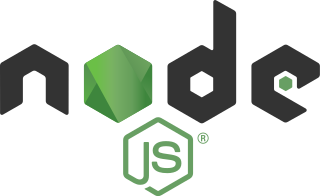
Node.js is a cross-platform, open-source server environment that can run on Windows, Linux, Unix, macOS, and more. Node.js is a back-end JavaScript runtime environment, runs on the V8 JavaScript engine, and executes JavaScript code outside a web browser.

Jasmine is an open-source testing framework for JavaScript. It aims to run on any JavaScript-enabled platform, to not intrude on the application nor the IDE, and to have easy-to-read syntax. It is heavily influenced by other unit testing frameworks, such as ScrewUnit, JSSpec, JSpec, and RSpec.

npm is a package manager for the JavaScript programming language maintained by npm, Inc. npm is the default package manager for the JavaScript runtime environment Node.js. It consists of a command line client, also called npm, and an online database of public and paid-for private packages, called the npm registry. The registry is accessed via the client, and the available packages can be browsed and searched via the npm website. The package manager and the registry are managed by npm, Inc.

Amber Smalltalk, formerly named Jtalk, is an implementation of the programming language Smalltalk-80, that runs on the JavaScript runtime of a web browser. It is designed to enable client-side development using Smalltalk. The programming environment in Amber is named Helios.
Mustache is a web template system with implementations available for ActionScript, C++, Clojure, CoffeeScript, ColdFusion, Common Lisp, Crystal, D, Dart, Delphi, Elixir, Erlang, Fantom, Go, Haskell, Io, Java, JavaScript, Julia, Lua, .NET, Objective-C, OCaml, Perl, PHP, Pharo, Python, R, Racket, Raku, Ruby, Rust, Scala, Smalltalk, Swift, Tcl, CFEngine, and XQuery.
QUnit is a JavaScript unit testing framework. Originally developed for testing jQuery, jQuery UI and jQuery Mobile, it is a generic framework for testing any JavaScript code. It supports client-side environments in web browsers, and server-side.
Pretty Diff is a language-aware data comparison utility implemented in TypeScript. The online utility is capable of source code prettification, minification, and comparison of two pieces of input text. It operates by removing code comments from supported languages and then performs a pretty-print operation prior to executing the diff algorithm. An abbreviated list of unit tests is provided. The documentation claims the JavaScript pretty-print operation conforms to the requirements of JSLint.
Yeoman is an open source client-side scaffolding tool for web applications. Yeoman runs as a command-line interface written for Node.js and combines several functions into one place, such as generating a starter template, managing dependencies, running unit tests, providing a local development server, and optimizing production code for deployment.

Ember.js is an open-source JavaScript web framework that utilizes a component-service pattern. It allows developers to create scalable single-page web applications by incorporating common idioms, best practices, and patterns from other single-page-app ecosystem patterns into the framework.

Nodeclipse is a set of third-party developer solutions for Eclipse for programming in JavaScript, CoffeeScript with focus on Node.js.
Mocha is a JavaScript test framework for Node.js programs, featuring browser support, asynchronous testing, test coverage reports, and use of any assertion library.
A headless browser is a web browser without a graphical user interface.

Browserify is an open-source JavaScript bundler tool that allows developers to write and use Node.js-style modules that compile for use in the browser.

Webpack is a free and open-source module bundler for JavaScript. It is made primarily for JavaScript, but it can transform front-end assets such as HTML, CSS, and images if the corresponding loaders are included. Webpack takes modules with dependencies and generates static assets representing those modules.
gulp is an open-source JavaScript toolkit created by Eric Schoffstall used as a streaming build system in front-end web development.
Grunt is a JavaScript task runner, a tool used to automatically perform frequent tasks such as minification, compilation, unit testing, and linting. It uses a command-line interface to run custom tasks defined in a file. Grunt was created by Ben Alman and is written in Node.js. It is distributed via npm. As of October 2022, there were more than 6,000 plugins available in the Grunt ecosystem.

Yarn is one of the main JavaScript package managers, developed in 2016 by Sebastian McKenzie of Meta for the Node.js JavaScript runtime environment. An alternative to the npm package manager, Yarn was created as a collaboration of Facebook, Exponent, Google, and Tilde to solve consistency, security, and performance problems with large codebases.
Next.js is an open-source web development framework created by the private company Vercel providing React-based web applications with server-side rendering and static website generation.

Deno is a runtime for JavaScript, TypeScript, and WebAssembly that is based on the V8 JavaScript engine and the Rust programming language. Deno was co-created by Ryan Dahl, who also created Node.js.
peacenotwar is a piece of malware/Protestware created by Brandon Nozaki Miller. In March 2022, it was added as a dependency in an update for node-ipc, a common JavaScript dependency.









